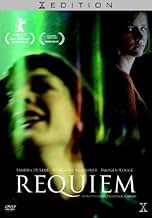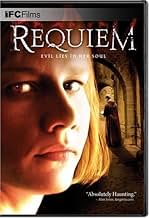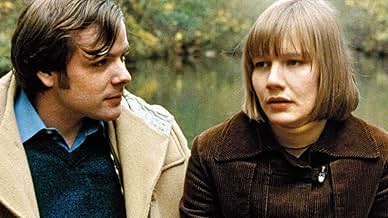CALIFICACIÓN DE IMDb
6.8/10
6.6 k
TU CALIFICACIÓN
Agrega una trama en tu idiomaA young woman with epilepsy suffers a breakdown during her first year at university, then decides to seek help from a priest in battling the troubles associated with her strict upbringing.A young woman with epilepsy suffers a breakdown during her first year at university, then decides to seek help from a priest in battling the troubles associated with her strict upbringing.A young woman with epilepsy suffers a breakdown during her first year at university, then decides to seek help from a priest in battling the troubles associated with her strict upbringing.
- Premios
- 16 premios ganados y 19 nominaciones en total
- Dirección
- Guionista
- Todo el elenco y el equipo
- Producción, taquilla y más en IMDbPro
Opiniones destacadas
In the 70's, in the countryside of Germany, the epileptic Michaela Klingler (Sandra Hüller) joins the pedagogy course in the university against the will of her pious mother Marianne {Imogen Kogge). However her father Karl Klingler (Burghart Klaußner) rents a room in a sorority house and the religious Michaela travels to Tübingen. Along the semester, Michaela befriends her former high school mate Hanna Imhof (Anna Blomeier) that forces her to seek medical assistance and falls in love for the student of chemistry Stefan Weiser (Nicholas Reinke). When Michaela has a crisis, she stops using the necessary drugs and believes she is possessed by demons, and her health gets worse. She decides to seek out the priest Martin Borchert (Jens Harzer) that believes in exorcism instead of the progressive parochial priest Gerhard Landauer (Walter Schmidinger) that tries to convince her to go to a psychologist. When she has an intense breakdown, her mother together with priest Borchert decide to exorcise her with tragic consequences.
"Requiem" is an impressive dramatic movie about the fight between religion and science. In accordance with the introduction of this film, the story would be based on a true event. The acting is wonderful, giving credibility to the plot, and the dialogs and characters present a great discussion between the dogmatic religion and reason. Michaela is very well developed and it is easy to understand her confused state of mind since she had a repressed and overprotected upbringing. Hannah represents the logic and the reason; Marianne and priest Borchert represent the backward and dogmatic side of the church; Karl and priest Landauer represent the in-between these two sides. "Requiem" is not a pleasant or entertaining feature but highly recommended for fans of a powerful drama with magnificent acting and the excellent German cinema. My vote is seven.
Title (Brazil): "Requiem"
"Requiem" is an impressive dramatic movie about the fight between religion and science. In accordance with the introduction of this film, the story would be based on a true event. The acting is wonderful, giving credibility to the plot, and the dialogs and characters present a great discussion between the dogmatic religion and reason. Michaela is very well developed and it is easy to understand her confused state of mind since she had a repressed and overprotected upbringing. Hannah represents the logic and the reason; Marianne and priest Borchert represent the backward and dogmatic side of the church; Karl and priest Landauer represent the in-between these two sides. "Requiem" is not a pleasant or entertaining feature but highly recommended for fans of a powerful drama with magnificent acting and the excellent German cinema. My vote is seven.
Title (Brazil): "Requiem"
Requiem works for many reasons--an intelligent script, understated direction, a somewhat verite camera style--but most of all it works because of Sandra Huller. For all of Michaela's exceptionalism, at no point could I doubt this character. As a recovering Catholic myself, I'm sensitive to the role religion, especially Catholicism, plays in people's lives; and Huller, in my opinion, creates the real thing: implicit faith that needs neither to advertise nor to apologize. Michaela's faith isn't about doctrine or rules but the meaning of life--more specifically, about living the meaning of one's own life, including its less attractive implications. Her faith makes her vulnerable to the devil (or, if you prefer, to her imagination that the devil is messing with her), but her faith also endows her growing suffering (and her eventual death, which she clearly foresees; note her reference to "martyrdom" in one of the last scenes) with an abundance of the same meaning that has sustained her life. She is peaceful at the end ("I must walk my path to the end.") That may be hard for a non-religious person to understand, but to someone raised on stories of the great saints, as Michaela was, it makes perfect sense. It is even something to be grateful for.
Requiem pulls off a bit of cinematic legerdemain in making Michaela a relatively open, non-fanatical, non-prudish woman in spite of the depth of her faith. Her real-life original, Anneliese Michel, wasn't much like that. She was a very conservative Catholic deeply opposed to the liberalization then occurring in the Catholic church after the Vatican Council. Her death and the subsequent trial of her parents and the exorcists forced a kind of confrontation, at least in Germany, between Catholic traditionalism, which has an entirely literal belief in spiritual realities and regards demonic possession and exorcism as established facts, and ecclesiastical modernism, which is embarrassed by such medieval notions and therefore preferred to take the position that Michel was "merely" mentally disturbed. (And if she were, did she suffer any the less? Was her faith any less meaningful to her?) Traditionalists regard Michel, her parents, and the exorcists as martyrs to a modernist church disloyal to its Christian past, and Michel's grave is today a pilgrimage site primarily for conservative Catholics. You'd never guess any of this from Requiem's very sympathetic treatment of her story.
Requiem pulls off a bit of cinematic legerdemain in making Michaela a relatively open, non-fanatical, non-prudish woman in spite of the depth of her faith. Her real-life original, Anneliese Michel, wasn't much like that. She was a very conservative Catholic deeply opposed to the liberalization then occurring in the Catholic church after the Vatican Council. Her death and the subsequent trial of her parents and the exorcists forced a kind of confrontation, at least in Germany, between Catholic traditionalism, which has an entirely literal belief in spiritual realities and regards demonic possession and exorcism as established facts, and ecclesiastical modernism, which is embarrassed by such medieval notions and therefore preferred to take the position that Michel was "merely" mentally disturbed. (And if she were, did she suffer any the less? Was her faith any less meaningful to her?) Traditionalists regard Michel, her parents, and the exorcists as martyrs to a modernist church disloyal to its Christian past, and Michel's grave is today a pilgrimage site primarily for conservative Catholics. You'd never guess any of this from Requiem's very sympathetic treatment of her story.
This movie doesn't have a clear message. Instead the title "requiem" really shows what this is about: looking at a person's life in every aspect of it. So the storytelling has to be much more from a distant viewpoint. Some may call this documentary-style as it seems to show a real social case study. Personally it reminded me a little bit of the early Scorseses style of movie-making (e.g. taxi driver): neutral viewpoint, but still subtle messages within, and finally the big clash in the ending, when all strings of the story developed throughout the movie come together.
For me, this is the best way of doing such a movie. First everything feels so normal as you watch the movie. In the end extreme situations begin to develop. Because you know the context, even it is a really extreme situation, it seems to be not at all inexplicable but very real, which it actually was. I could personally feel the helplessness with this situation, because I could not blame anybody in the movie, there was not a side who did anything wrong on purpose. All are just human beings, who are presented perfectly and believable through very good acting. The final shot of the girl's face with background organ music expresses many feelings I have about the movie.
All in all it is a very good movie, but of course it still does not feel as great as some of the best movies of the time. 9 stars
For me, this is the best way of doing such a movie. First everything feels so normal as you watch the movie. In the end extreme situations begin to develop. Because you know the context, even it is a really extreme situation, it seems to be not at all inexplicable but very real, which it actually was. I could personally feel the helplessness with this situation, because I could not blame anybody in the movie, there was not a side who did anything wrong on purpose. All are just human beings, who are presented perfectly and believable through very good acting. The final shot of the girl's face with background organ music expresses many feelings I have about the movie.
All in all it is a very good movie, but of course it still does not feel as great as some of the best movies of the time. 9 stars
Phew this is hard to put into words.
At first I thought the cinematography was stunning, beautifully shot and the period was captured perfectly - I felt like I was watching a film shot in 1972 and it brought back early memories of the 70s.
The script was wonderfully subtle, there was absolutely no judgements about the characters. It would have been very easy to show the mother as a cruel an twisted woman but instead you could empathise with her, she thought she was doing the best for her daughter and that made the whole thing more tragic but also more real and beautiful.
To me the central message of the film was that life, however short is something to celebrate. The girl makes references to St Katarina who only lived a short time but did many wonderful things. She may not have escaped her strict and cruel mother for long but at least she did it and had a wonderful time for a while.
I kept having to tell myself they were actors. The depiction of the girl's first kiss at college was unlike any other I've seen. They captured the clumsiness and true feeling of the situation perfectly.
And finally the soundtrack - you'd think that deep purple wrote 'Anthem' for this film. Earlier we see her dancing ecstatically to the track when she's finally free at college and then we later see the relevance when it's used to play out at the end of the film.
I'm not sure I'll ever see a better film that this and I recommend it to anyone who occasionally likes to be moved by a movie.
At first I thought the cinematography was stunning, beautifully shot and the period was captured perfectly - I felt like I was watching a film shot in 1972 and it brought back early memories of the 70s.
The script was wonderfully subtle, there was absolutely no judgements about the characters. It would have been very easy to show the mother as a cruel an twisted woman but instead you could empathise with her, she thought she was doing the best for her daughter and that made the whole thing more tragic but also more real and beautiful.
To me the central message of the film was that life, however short is something to celebrate. The girl makes references to St Katarina who only lived a short time but did many wonderful things. She may not have escaped her strict and cruel mother for long but at least she did it and had a wonderful time for a while.
I kept having to tell myself they were actors. The depiction of the girl's first kiss at college was unlike any other I've seen. They captured the clumsiness and true feeling of the situation perfectly.
And finally the soundtrack - you'd think that deep purple wrote 'Anthem' for this film. Earlier we see her dancing ecstatically to the track when she's finally free at college and then we later see the relevance when it's used to play out at the end of the film.
I'm not sure I'll ever see a better film that this and I recommend it to anyone who occasionally likes to be moved by a movie.
A sad tale of a young girl's aspirations disastrously ruined by her and her family's inability to separate her religion from her mental illness.
The script is commendably non-judgemental, despite the subject matter, and the the movie's early seventies setting is re-created so convincingly (with muted colours and almost dogme-like camera work) that one might forget that the film was shot only three years ago.
Some may find that the film ends before the story does, but this is merely a refreshing refusal to pander to sensationalism that is completely in keeping with the naturalistic realism of the film as a whole.
The script is commendably non-judgemental, despite the subject matter, and the the movie's early seventies setting is re-created so convincingly (with muted colours and almost dogme-like camera work) that one might forget that the film was shot only three years ago.
Some may find that the film ends before the story does, but this is merely a refreshing refusal to pander to sensationalism that is completely in keeping with the naturalistic realism of the film as a whole.
¿Sabías que…?
- TriviaSandra Hüller's feature film debut.
- ConexionesFeatured in The Making of 'Requiem' (2006)
- Bandas sonorasDown 'n' Out
Performed by Light of Darkness
Written by J. Latimer, B. Grant, M. Reoch and M. Bebert
Courtesy of MOP-Musikverlag Hans Sikorski KG
With kind permission of Second Battle Records
Selecciones populares
Inicia sesión para calificar y agrega a la lista de videos para obtener recomendaciones personalizadas
- How long is Requiem?Con tecnología de Alexa
Detalles
- Fecha de lanzamiento
- País de origen
- Sitio oficial
- Idioma
- También se conoce como
- Requiem
- Locaciones de filmación
- Productoras
- Ver más créditos de la compañía en IMDbPro
Taquilla
- Total en EE. UU. y Canadá
- USD 9,600
- Fin de semana de estreno en EE. UU. y Canadá
- USD 3,309
- 22 oct 2006
- Total a nivel mundial
- USD 262,460
- Tiempo de ejecución1 hora 33 minutos
- Color
- Mezcla de sonido
- Relación de aspecto
- 2.35 : 1
Contribuir a esta página
Sugiere una edición o agrega el contenido que falta

Principales brechas de datos
What is the Spanish language plot outline for La posesión (2006)?
Responda

























